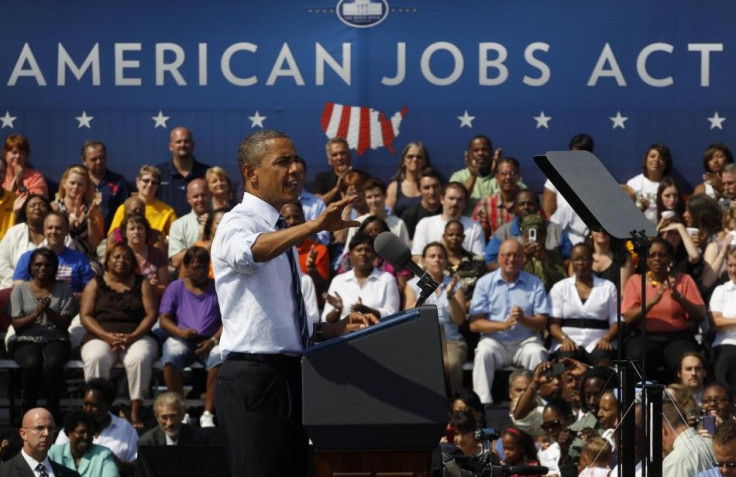American Jobs Act: Obama's Plan Would Not Increase Taxes on Job Creators
ANALYSIS

Less than a week after Republicans leaders urged compromise on President Barack Obama's American Jobs Act, the partisan battle lines in Washington have once again been drawn, with House Speaker John Boehner, R-Ohio, flatly rejecting Obama's proposal to finance his jobs plan they assert contains a tax increase on job creators. But is it really?
It depends how you define job creators.
The measures Obama has proposed to cover the $447 billion cost of the American Jobs Act are threefold. First, he would eliminate some of the tax deductions available to wealthy Americans -- defined as individuals with annual incomes over $200,000 and families with annual incomes over $250,000. Second, he would cut tax subsidies for oil and gas companies. Third, he would raise taxes on some hedge fund managers and on corporate jet owners.
House Majority Leader Eric Cantor, R-Va., responded icily: I sure hope that the president is not suggesting that we pay for his proposals with a massive tax increase at the end of 2012 on the job creators that we're actually counting on to reduce unemployment.
This statement is grossly misleading. By Republicans' own admission, the biggest job creators are small businesses -- and small businesses would receive substantial tax cuts from the jobs plan. Their payroll taxes would be cut in half, and any small business that hired new employees or raised salaries for current employees would get an additional tax break.
The people and companies whose taxes would increase under Obama's plan are not the job creators that we're actually counting on to reduce unemployment. Wealthy individuals, hedge fund managers and corporate jet owners do not create many jobs. The only proposal that could be called a tax increase on job creators is the elimination of subsidies for oil and gas companies -- but in comparison to small businesses, these companies account for a very small percentage of job creation.
A Tax Credit Aimed At Job Creators
We can help the people who create most of the new jobs in this country. That's America's small business owners, Obama told an audience in Ohio on Tuesday. It's all well and good that big corporations have seen their profits roaring back. That's good. We want them to be able to hire people as well. But smaller companies haven't come back.
And yet, the airwaves are still full of remarks like this one, from Iowa Sen. Chuck Grassley: The reason you wouldn't want to raise taxes is because the whole philosophy is, you tax something, you get less of it. So why would you want to tax employment if you want to increase employment, particularly among small businesses, where 70 percent of the new jobs are created?
With his last line, Grassley destroyed his own argument. Small businesses create 70 percent of new jobs, and small businesses would have lower taxes under Obama's plan. The tax increases wouldn't touch that 70 percent of job creators.
So what's the problem?
The problem is that this isn't about Republicans opposing increased taxes for job creators, which would be a very reasonable objection. It's about Republicans opposing increased taxes, period. Cantor was more honest in his statement to Bloomberg TV after Obama unveiled his plan on Thursday: Republicans don't believe in raising taxes for anybody.
That's a fine position -- but not when it means sabotaging tax cuts for real job creators in the name of opposing tax increases for companies that create far fewer jobs. At that point, it ceases to be a principled stand and becomes a spectacle of the Republican Party cutting off its nose to spite its face.
Will Obama's plan create all the jobs the country needs? No -- so Republicans can and should propose additional ideas to create more jobs, and Democrats should seriously consider them.
But there is no denying that increased spending on highway and other infrastructure projects will reduce unemployment, just as President Franklin D. Roosevelt's Works Progress Administration (WPA) did during the Great Depression of the 1930s. There is also no denying that tax cuts for small businesses will increase private-sector hiring, which is exactly what Republicans want to do.
Increasingly, Republicans are vetoing new taxes for anyone, under any circumstances. It would be a shame if they let that absolute opposition interfere with a plan to reduce taxes for, yes, job creators.
© Copyright IBTimes 2024. All rights reserved.











